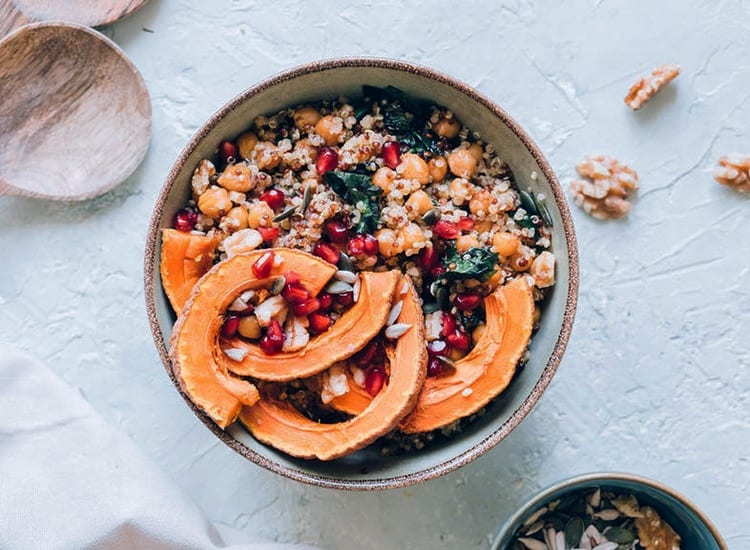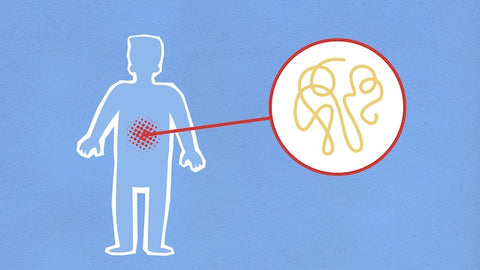Clean 21: 21 Day Detox
Our Signature 21-Day Full-Body Reset
Questions? Ask about this product
Free Shipping On Orders Over $50
Complementary products


Did you know that all chronic diseases share a common factor? Even smaller-scale health issues like aging skin and wrinkles, acne, weight gain, and joint pain can all be traced back to inflammation. Reducing inflammation through food and lifestyle choices is a great way to look younger, lose weight, feel better, and lower your risk for chronic disease. An anti-inflammatory diet is one of the most important steps you can take right now to see significant improvements in your health while protecting yourself long-term.
Inflammation is the body’s natural response to stress. In many ways, inflammation is necessary and beneficial to us. When we have an injury or illness, acute inflammation is part of the process that allows for cellular repair and destruction of illness-causing pathogens. Think about swollen lymph nodes or the way your skin gets red and puffy if you scrape your knee – these are examples of inflammation helping the body to repair.
However too much stress, both physical and emotional, over an extended period produces excess or chronic inflammation. Inflammation at these levels has a detrimental effect. Instead of aiding in repair and recovery, we see that inflammation can cause more tissue damage and weaken the immune system. From heart disease, Alzheimer’s, and rheumatoid arthritis to certain cancers, each of these debilitating conditions is rooted in chronic inflammation.

Many factors like stress, lack of activity, and genetic predisposition play a role here, but dietary and environmental toxins are two of the biggest sources of inflammation. Foods like canola and corn oil, processed foods, gluten, dairy, sugar, and alcohol can all cause chronic inflammation over time. Adopting an anti-inflammatory diet and reducing exposure to toxins by switching to non-toxic skin care products are two of the easiest and fastest ways to reduce inflammation.
Transitioning to an anti-inflammatory diet doesn’t have to be complicated. Focusing on a delicious diet rich in whole foods that reduce inflammation will naturally crowd out pro-inflammatory processed foods. Here are our favorite tips for an easy and satisfying anti-inflammatory diet:
Filling your diet with primarily organic, whole foods will automatically cut out a lot of problematic foods. Here are some anti-inflammatory diet superstars to keep on your plate: Fresh produce contains powerful antioxidants and phytonutrients like beta-carotene that actively fight free radicals and inflammation. Fill half of your plate with veggies at each meal, aim for a variety of colors in your produce each day, and add greens to your smoothies to get the benefits of anti-inflammatory plant power.
Herbs and spices: Flavor your dishes, juices, and smoothies with inflammation-busting herbs and spices like ginger, turmeric, and cinnamon.
Fiber: Fiber lowers C-reactive protein (CRP), an inflammatory marker in the blood. Whole fruits and veggies will give you a healthy dose of fiber, but whole grains like brown rice and gluten-free oats, and legumes like black beans and chickpeas are another great addition to an anti-inflammatory diet.
Healthy fats: These include anti-inflammatory omega-3 fats from foods like salmon and sardines, olive oil, hemp, flax, and chia seeds.
Protein: Conventional meats full of hormones and antibiotics are very inflammatory, so if you choose meat, be sure to choose organic, pasture-raised meats. Vegetarian sources of protein like whole grains and legumes and a quality, clean protein powder are also great.
There are certain foods that we know increase inflammation, so avoiding or limiting these foods will support your anti-inflammatory diet:
Sugar: Learn to read food labels: you might be surprised to learn that added sugar is in virtually every prepackaged food on the market.
Refined carbohydrates: refined white flour, cereals, packaged and/or processed cookies, cakes, and breads. Don’t be fooled, even gluten-free goods can be loaded with refined flour, sugar, and starches.
Food sensitivities or triggers: gluten and dairy are common sources of a lot of inflammation.
Refined oils: These oils like corn, canola, safflower, sunflower, peanuts, and vegetable oil can be inflammatory. We have some good alternative oils listed here.
Alcohol: Alcohol taxes the liver and can feed pathogenic bacteria in the gut. How many of us have looked in the mirror after a night of drinking and seen the drinking-related inflammation signs in our puffy faces and dehydrated skin?
An annual detox is a great way to support the body in clearing any accumulated toxins while supplying a heavy dose of superfood detoxifiers and antioxidants to reduce inflammation. A 21-day cleanse can help you identify personal food sensitivities so you can personalize an anti-inflammatory diet that works best for you!
Written by Clean Team
If you enjoyed this article, you might also like How Inflammation Is Messing with Your Digestion
Sources:
Natural Anti-Inflammatory Diet
Inflammation: Both Friend and Foe
Chronic Stress Changes Immune Cell Genes, Leading To Inflammation: Study
Alcohol, inflammation, and gut-liver-brain interactions in tissue damage and disease development